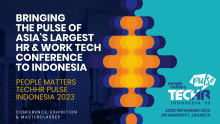HR trends in shaping the new world of work

Businesses across sectors faced turbulent times during the COVID-19 period as uncertainty loomed large. For many the very survival seemed like a question of if and not when. However, for many others, the pandemic also presented opportunities hitherto unexplored as the market dynamics changed towards a new normal. With the economic scenario expected to improve, HR policies and long-term roadmaps will play a pivotal role as businesses look to revive and consolidate.
As HR leaders prepare to welcome the New Year, they need to brace themselves up for the new normal, with the role of HR set to become ever more critical. They need to focus on the problems they have had to face, find innovative and viable ways to insulate the workforce from future disruptions. Five workplace models will definitely be adopted by HR leaders from 2020 to 2021: completely collocated, on-site alternation, on-site on-demand, linked remote, and work from anywhere. They are going to have to compete in the new normal with a new wave of white-collar workers: digital nomads.
With the ongoing disruption in the market, conventional ways of working have become a thing of the past. It is important for HR to reconsider policies and processes in line with the new standard and below are few trends that HR leaders will need to prioritise to accommodate millennials.
- Digital Transformation: The digital transformation of HR has significantly helped to rejuvenate a wide variety of industries impacted by the pandemic.From healthcare to aviation, automobiles to media, HR tech has performed wonders to stop any sector affected from sliding into the dark pit of crisis, in ways that are unimaginable. The modern age of interactive tools certainly deserve a fair share of credit in making it possible. By introducing new technologies such as AI, ML algorithms to gain insight into internal operations, HR is actually winning this trend game. It is expected that HR tech will expand even more than 100 percent of what it is now.
- Adopt design thinking: The dominant approach to the creation of clever new products and differentiated customer interactions has been design thinking. Due to the COVID-19 induced lockdown and consequent economic and social slowdown, the call to think differently about employee engagement has taken alarming proportions, which has forced thousands of workers to pursue sub-optimal forms of working and spending time with their families and themselves. In a nutshell, adoption of design thinking can lend in a lot of new outlooks to the human resources function, which is becoming core to organizational revival and employee engagement during these trying times.
- Workplace Consumerization: Employees are looking for a specific work experience that empowers them to make their own decisions when it comes to their work and goals. They now prefer to bring a consumer mind-set to their workplace and would want individualised schedules, benefits, and job roles. For instance, Millennial and Gen Z, unlike older generations, who are still following the hierarchical management model, expect more transparent and collaborative management practices. Therefore, HR leaders would be more flexible and versatile in catering to employees’ individual needs.
- Reskilling and up-skilling of Workforce: With HR teams facing a lack of talent, trends show the growing importance of reskilling. According to the OECD, more than 1 billion jobs, or about one-third of all jobs worldwide, are expected to be transformed by 2030. This transition will lead to certain job roles being redundant and new ones being created. So, instead of mounting efforts to hire talented workforce, more CEOs, executives, and HR teams should focus on reskilling and up-skilling their existing employees to fulfil the innovation needs of their organization and meet corporate goals.
- Employee Wellness: In a post-COVID-19 world where organisations have had to change how they work, all HR managers need to switch towards a more human-centric approach. HR would need to prioritize the employees’ mental health and overall well-being more after recognising the distress and tension of the COVID-19 pandemic. A common way of bringing wellness to an organisation is through holistic benefits. These benefits cover all facets of well-being, including mental health and financial wellbeing. Although these programmes will differ in offerings, but the idea is to provide benefits to employees that can help them to improve their well-being beyond traditional health coverage.
















